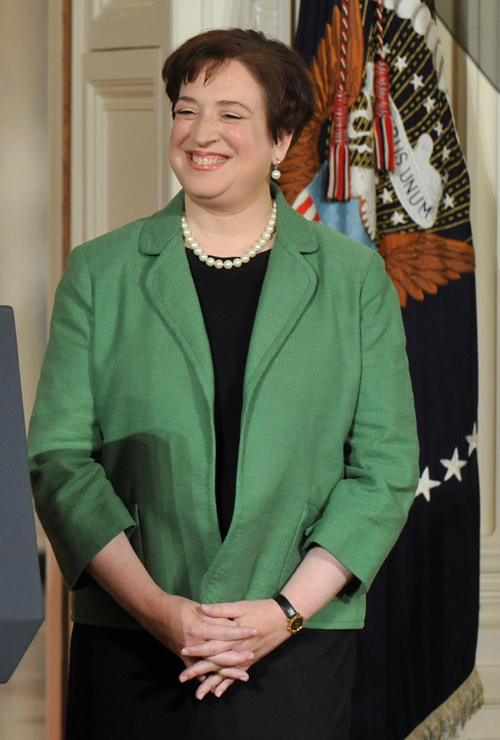The White House is moving quickly to portray Elena Kagan as a worthy successor to the retiring Justice John Paul Stevens, emphasizing that her “leadership qualities” are what set her apart from the other contenders on the Supreme Court short list. The implication is that the President sees in Kagan someone who can be an intellectual counterweight to Chief Justice John Roberts.
“You can’t overnight replace 34 years of experience,” presidential adviser David Axelrod told reporters, but Kagan “shows the prospect over time of stepping into those shoes and being a leader on the court.”
Axelrod and White House Counsel Bob Bauer briefed a small group of reporters in the Old Executive Office Building next door to the White House about an hour after President Obama publicly unveiled Kagan in a ceremony in the East Room.
Acknowledging that Stevens’ retirement leaves what Axelrod called a “leadership void on the court,” the two men returned again and again to Kagan’s leadership qualities as being the deciding factor for the President. It came down to “her capacity to become a real leader on the court over a long period of time,” Axelrod said.
There were other attributes that were a factor in picking Kagan, Axelrod said. Among them was her relative youth (she’s 50 years old) and that she would become the third woman on the court, a first. But while those factors enhanced Kagan’s appeal, they were not determinative, Axelrod said.

Axelrod joked that Kagan’s selection was a “shocking development,” before acknowledging that she had been in the picture from the get-go, as evidenced by what he half-heartedly referred to as “an unconscionable number of leaks.”
The briefing offered little evidence that President Obama is determined to nudge the federal judiciary toward the left in the same way that Republican Presidents have set out to remake the courts with conservative scholars and jurists. The White House offers no sweeping progressive vision for the courts, and little to suggest that this President is applying the kind of long-term strategic thinking that conservatives have brought to bear on the nomination and confirmation processes as a way to further solidify their ideological hold on the judiciary.
Asked if the President approached judicial selections in the same strategic way as recent Republican Presidents, Bauer said that framing the issue as liberal or conservative oversimplified matters, and Axelrod dismissed it as a Washington preoccupation: “I know that there is an obsession in this town to place this on the ideological spectrum.” Axelrod asserted that the President’s judicial philosophy was best expressed colloquially: “Everyone should get a fair shake in the courts, not just the powerful.”
Axelrod and Bauer dismissed some of the early lines of attack Republicans are testing against Kagan. What about her lack of experience as a judge? “I don’t think you’re going to see many people arguing that point,” said Axelrod, who described Kagan as “supremely qualified.” On refusing access to her campus by military recruiters when she was dean of the Harvard Law School, Bauer said the move had no impact on military recruitment and that Kagan has testimonials from Harvard military veterans about the high esteem in which she holds servicemen and women.

Bauer also rejected the suggestion that there was any personal animosity toward Kagan by Chief Justice John Roberts, particularly in a recent Supreme Court opinion where Roberts sharply rejected the government’s position as advanced by Kagan. “I don’t read anything into the exchange … other than the strength of the disagreement the chief justice was expressing,” Bauer said.
Kagan has written that Supreme Court confirmation hearings are bland and substanceless, a characterization that Republicans have suggested they may use to press her to be more revealing in her own confirmation hearing. Asked about that, Bauer suggested there’s a balance to be struck between saying nothing of substance and inappropriately pre-judging cases that may come before the court. “I have every confidence that she is going to be forthright and candid within the bounds of what’s appropriate,” Axelrod said.
Asked whether the president would assert executive privilege in refusing to release Clinton administration records of Kagan’s tenure in the White House counsel’s office, Baur demurred slightly, “I anticipate no difficulty in making relevant information available.”










